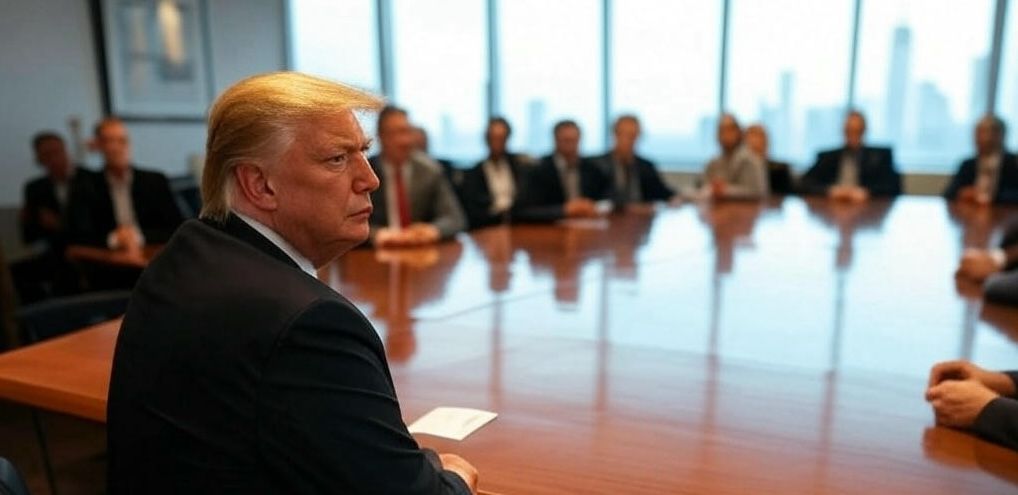
Donald Trump’s aggressive push for sweeping reciprocal tariffs is increasingly drawing sharp criticism not just from global trading partners, but also from his allies in the business community and his own party.
What began as a bold economic move to shore up domestic manufacturing has now spiralled into a source of growing alarm, as concerns mount over potential damage to the US economy and its global standing.
Prez losing the confidence of global business leaders: Ackman tweets
The discontent spilled into the open over the weekend, as prominent investor Bill Ackman, a former Trump endorser, issued a rare and pointed rebuke.
In a lengthy statement, Ackman cautioned that the president’s tariff-heavy strategy could isolate the United States and trigger a devastating global economic backlash.
“By placing massive and disproportionate tariffs on our friends and our enemies alike and thereby launching a global economic war against the whole world at once, we are in the process of destroying confidence in our country as a trading partner, as a place to do business, and as a market to invest capital,” Ackman said.
He urged Trump to pause for 90 days to negotiate fairer trade agreements rather than escalate tensions.
“If, on April 9th, we launch economic nuclear war on every country in the world, business investment will grind to a halt, consumers will close their wallets and pocket books, and we will severely damage our reputation with the rest of the world that will take years and potentially decades to rehabilitate,” Ackman warned.
The country is 100% behind the president on fixing a global system of tariffs that has disadvantaged the country. But, business is a confidence game and confidence depends on trust.
President @realDonaldTrump has elevated the tariff issue to the most important geopolitical
15.5K
Reply
Copy link
Corporate America grows anxious as market turmoil deepens
Business leaders are increasingly voicing their concerns, albeit cautiously.
At the Yale CEO Caucus held last month, an impromptu poll revealed a growing sense of unease among top executives about the potential fallout from Trump’s trade policies, Fortune reported.
According to the Wall Street Journal, 44% of CEOs said they would raise their concerns if markets plunged by 20%, while 22% pointed to a 30% drop, and 10% cited a catastrophic 50% decline.
Nearly a quarter believed it was not their role to intervene.
Jeffrey Sonnenfeld, the Yale professor who convened the summit, noted that many CEOs feel caught between their economic anxieties and political risks.
“They don’t want to be the lightning rod,” he said. “Then it becomes personalized to them.”
Privately, corporate board members are urging discreet lobbying rather than public confrontation.
“You don’t want to be the barking dog for everyone else because you’re going to be the one who will get shot,” one board member told the Financial Times.
Another emphasised the need for quiet diplomacy, advising Trump’s aides that tariffs would hurt his core constituents through rising prices and job losses.
Adding to the growing chorus, the Business Roundtable issued a carefully worded statement supporting the president’s goal of fair trade but cautioning that universal tariffs between 10% and 50% risk severe harm to American manufacturers, workers, and families.
Republican dissent signals cracks in party unity
The business community is not alone in its apprehensions. Republican lawmakers are beginning to break ranks, publicly questioning the wisdom of Trump’s tariff blitz.
Senator Ted Cruz of Texas issued a stark warning, predicting that Republicans could face a “bloodbath” in the 2026 midterm elections if Trump’s tariffs triggered a recession.
“There are voices within the administration that want to see these tariffs continue for ever and ever,” Cruz cautioned.
He emphasised that retaliatory measures from other nations could devastate American jobs and the broader economy.
Senator Thom Tillis of North Carolina voiced similar concerns, highlighting the risks to farmers in his state.
“Anyone who says there may be a little bit of pain before we get things right need to talk to my farmers who are one crop away from bankruptcy,” he told CNN.
Further cracks emerged just hours after Trump unveiled what he called “liberation day” tariffs.
Four Republican senators defied the president by voting for a Democrat-led Senate resolution demanding the reversal of a 25% tariff on Canadian goods.
While largely symbolic, the resolution garnered support from prominent Republicans including Senate Minority Leader Mitch McConnell, Rand Paul, and Susan Collins.
The dissenting voices reflect a broader, though often muted, discomfort within the party. Many fear political repercussions from Trump loyalists but privately acknowledge the potential economic fallout.
Markets reel as tariffs spark global rout
Meanwhile, despite the warnings, Trump remains defiant. Speaking to reporters aboard Air Force One on Sunday, the president defended his strategy, claiming that short-term pain was necessary for long-term gain.
“Sometimes you have to take medicine to fix something,” he remarked. Trump predicted that jobs and investment would flood back to the United States, making it “wealthy like never before.”
His top officials reinforced that message, insisting the tariffs would proceed as planned and downplaying the threat of recession.
Yet, global markets told a different story.
Within hours of Trump’s comments, Asian markets plunged. Japan’s Nikkei 225 tumbled 7.8%, while Hong Kong’s Hang Seng Index suffered an even steeper fall of over 12%.
According to Deutsche Bank analysts, the rout marked the fourth worst two-day market slump since World War II, eclipsed only by the crashes of 1987, the 2008 financial crisis, and the early days of the Covid-19 pandemic.
Deutsche further warned that the market disruption was the most severe since President Richard Nixon abandoned the gold standard in 1971, underlining the gravity of the unfolding turmoil.
The post From Wall Street to GOP, Trump tariffs trigger growing opposition appeared first on Invezz

